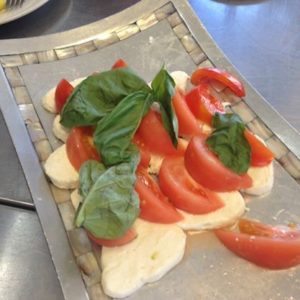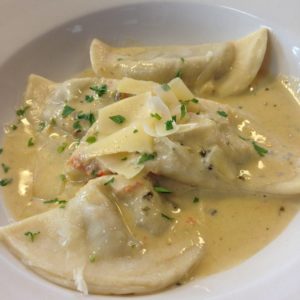Spending nearly seven years in a corporate environment, a word I quickly got desensitized to was “diversity.” It’s on posters, in employee handbooks, on the lips of managers—it’s everywhere except written in the sky. You hear it so much that it begins to lose its meaning and starts to just blend into the white noise of the corporate office, mixing with non-words like “synchronicity,” “liaison,” “synergistic,” and “morale.”
But unlike these other words, diversity has a specific and important meaning that I think gets overlooked in this world of political-correctness, uniformity, and exclusivity. And I’m not talking just about diversity of race, creed, or nationality, so don’t tune me out and click to something more exciting. What I’m talking about is diversity of experience.
The idea for this blog entry hit me on Monday of this week when Chef Jean-Claude was discussing his own experiences. As an ethnically Italian man whose grandparents immigrated to France and who currently lives in America, it turns
out his experiences have a level of diversity that’s hard for most people to match.
I’m eventually going to interview Chef JC for this blog, so I don’t want to give too much away, but he’s been a chef in numerous countries throughout Europe, numerous states throughout the US, held most positions in the culinary industry,
and seemingly knows everyone who has any connection to the kitchen everywhere. He’s got military experience in France, kitchen experience in the Ritz, and teaching experience at Auguste Escoffier.
This is the kind of diversity of experience I’m talking about. There is a myth in modern America (and beyond, no doubt) that singularity of experience is the most prized possession a human mind can have. “I’ve been in this business thirty years!” is a phrase you hear on television, in movies, and throughout pop culture, often shouted by a grizzled veteran who magically has all the answers. This gives a (false, in my opinion) impression that it’s the most desirable state to be in—do a job for so long, that you know it inside and out.
While I have talked about the benefits of experience in the past and will not say that a deep experience is a bad thing, I will state emphatically that it not the only thing. Let me explain:
My wife Tressa is a pastry chef at the Guard and Grace downtown. But she’s also fluent in Korean, has an amazing singing voice, skilled enough with writing to be my editor, is well-read, experienced as a babysitter, and has lived in Alaska, Oklahoma, California, Oregon, Hawaii, and (briefly) Seoul. If she had only been a pastry chef for her whole life, she might know an extra trick or two in the kitchen, but she’d have an immensely shallower pool of experience to draw from when the need for Inspirado loomed its head.
This might seem like a contradiction, but it’s not—deep and diverse experience is what leads to greatness. Some may be able to slide with one or the other, but going back to ancient times, it’s the people who have both that have changed the world.
And yes, that’s a lot to ask of yourself. Of course it is. Greatness demands nothing less than our utmost effort. But there’s good news! If you’re reading this, sipping your glass of soda or your mug of coffee while thinking to yourself “I don’t have either, what am I to do?” just breathe and relax. Experience isn’t necessarily an Easter hunt where you rush around gathering up eggs of knowledge as quickly as you can.
Experience is something that happens if you allow it to. Never feel like you’re too old, too young, too broken, too sick, or too tired to experience new things. Change can be terrifying—one of the most terrifying things there are. Zen Buddhist monk Thich Nhat Hanh has a saying: “People have a hard time letting go of their suffering. Out of a fear of the unknown, they prefer suffering that is familiar.” But overcoming that fear in order to gather more and more experience will not only help you in the kitchen, or in your career. It will help you go out and get the kind of life dream about.
To quote Brother Thich again: “Because you are alive, everything is possible.”





